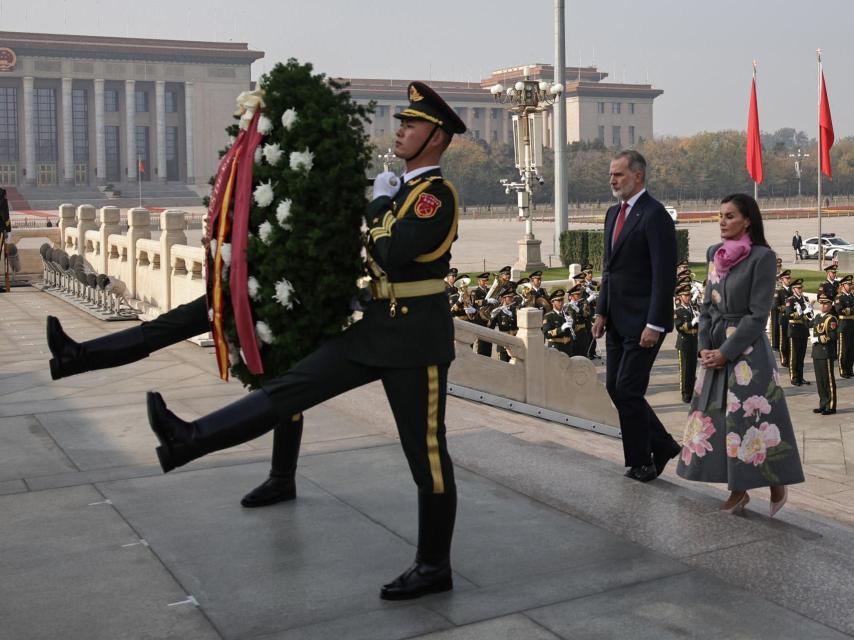The monarchy has always played a prominent role in Spain’s relations with China.
The kings Juan Carlos y Sofia They first traveled to China in June 1978. They were the first European monarchs to visit the People’s Republic, just two years after the death of Mao Tse-Tung.
The kings met with Deng Xiaopingwhich was just outlining its “policy of economic reform and opening to the outside”, proclaimed in November of the same year, and which in a few decades would change the world economically and geopolitically.
Our businessmen came to China later, but not the monarchy, which played the vanguard role. Juan Carlos I would later make two other state visits to China.
As prince of Asturias, Philip VI He visited China in 2000, and again in 2006, accompanied by the princess Joyto inaugurate the Cervantes Institute in Beijing.
This is the first state trip of the kings.
King Felipe VI greets the Chinese president, Xi Jinping, in the presence of Queen Letizia and the first lady, Peng Liyuan.
EFE
In 1989, after the events of Tiananmen, Spain held the presidency of the then called European Economic Community.
After the rigorous sentences, the Government of Felipe González followed a policy with China different from that of the rest of the EEC. The bilateral Economic Commission and credits were maintained.
Later, the Spanish Minister of Foreign Affairs, the President of the Government and the Head of State were the first from the EEC to visit China after 1989.
The reason for that attitude was to understand that Deng Xiaoping and his reforms were on the ropes.
The most conservative Chinese elements, who always viewed private companies, market mechanisms and thousands of students in Western countries with suspicion, criticized Deng Xiaoping that Western countries They would only support him in his economic reforms if he accepted the regime change that the students were asking for in the square..
That is, if he agreed to pay an unacceptable political price in return for economic aid.
The president of the United States, the first Bushwho had been in charge of his country’s Liaison Office in China, decided to save the bilateral relationship by sending his National Security Advisor, General Brent Scowcrofta few days after the use of military force against protesters.
“China thanked Spain for its attitude by publicly calling it ‘China’s best friend in Europe’ for twenty-five years, until our judges, invoking ‘universal justice’, attempted to bench several of its leaders.”
In their Memoirsthe then Chinese Foreign Minister, Qian Qichenwrote: “In the general wave against China at that time, Spain was the country that did not go with the flow and showed its understanding of the Chinese situation.”
China appreciated Spain’s attitude by publicly calling it “China’s best friend in Europe” for twenty-five years, until our judges, invoking “universal justice”, tried to put several of its leaders on the bench.
Since then they call us “one of their good friends in Europe.”
The words were backed by actions. Spanish companies benefited and China bought Spanish debt permanently.
I had the opportunity, as ambassador, to accompany the Minister of Finance, Elena Salgadoto visit his Chinese colleague, Lou Jiweiin November 2011, during the most difficult moments of the euro crisis. The Chinese minister asked: “What can we do to help?”
Although the figures are secret, It is estimated that China had 20% of the Spanish debt in the hands of foreignersequivalent to 12% of the total debt.
The president Pedro Sanchez He has traveled to China three times in the last three years in defense of Spanish interests. China is a prominent leader in production chains and technologies related to the energy transition, and its investments in Spain have already materialized in the Chery electric car plant in Barcelona and the CATL battery plant in Zaragoza.
His last visit drew criticism from the United States Secretary of the Treasury, Scott Bessantwith the words. “Go near China and you’ll cut your own throat.” Obviously, it was a warning to all European countries.

Felipe VI and Queen Letizia follow honor guards during a ceremony at the Monument to the People’s Heroes in Tiananmen Square.
EFE
However, when a few weeks later the United States was forced to negotiate with China, Bessent himself did so without asking the Europeans for permission.
For one country to tell another what it can or cannot do is to consider it to have limited sovereignty. A vassal.
In China, King Philip recalled the “hard lessons” of the 20th century, concluding with the advice “let us never abandon, no matter how difficult it may be, the search for harmony.”
Europe demands “strategic autonomy.” That is, full sovereignty. The flip side of this concept is “moderating power.” There is no more important or more honorable task for Europe than trying to help the two great powers reach a common ground. way of life, a formula for peaceful coexistence.
Because an armed conflict between them could lead to the “end of history.”
Because it would ruin global economic prosperity.
And because the great common challenges, from climate change to the regulation of artificial intelligence, would be impossible.
The king’s call to harmony is the voice of reason. These days in Beijing, once again, the monarch has proven to be the best ambassador of Spain, and of Europe.
*** Eugenio Bregolat is a diplomat and former ambassador of Spain to China.

